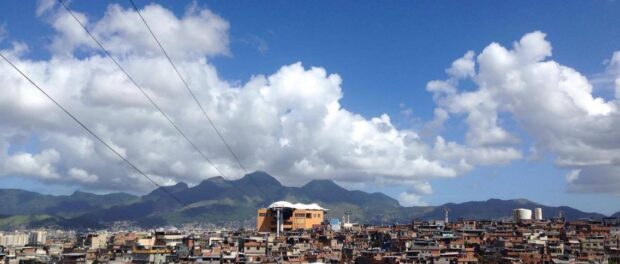
On Saturday, April 1, the community project Raízes Locais (Local Roots) led a group of visitors on a historical tour of the Complexo do Alemão in Rio’s North Zone. The visit brought together favela residents and news organizations as well as teachers and researchers from outside the community, part of the project’s effort to create “dialogue between academic and popular knowledge.”
Among Rio’s largest favelas, Alemão has a rich history. One of the first stops on the tour was Travessa Laurinda, one of the oldest streets in the complex, where twice last year and again in January this year, the community organized a mutirão, or collective action, to plant trees and install stairs up the steep hillside. As longtime community organizer Alan Brum Pinheiro recounted, in the 1920s the land that is now Alemão was owned by two families, who eventually sold some of the land to a Polish immigrant, Leonard Kaczmarkiewicz. “O Alemão,” or “The German,” as he came to be known thanks to his European looks and distinctive surname, began renting parts of his land to locals in a system known as aluguel do chão, or “renting the floor,” in which tenants were allowed to build houses on plots of land without becoming its formal owners. From its origins on the “German’s Hill,” or “Morro do Alemão,” the favela spread out over neighboring hills in subsequent years, eventually evolving into the complex that it is today.
The visit stopped by sites with recent significance to residents. A cross near the top of the hill, originally built by the Catholic Church, was torn down in 2007 by occupying police forces who wanted to stop it from functioning as a landmark for drug traffickers, until the intervention of a local priest forced the State to rebuild it. In another location, on the edge of a green space reforested by residents beginning in 1997, residents pointed out an abandoned building in the middle of a field. Raízes Locais guides revealed that the space used to be a soccer field, closed by the State to build a bike park for the Olympics—abandoned six years ago—and recalled how, in the old days, residents from all over Alemão used to frequent the field on Sundays, playing in the community’s soccer league or riding bicycles and socializing.
Raízes Locais is a project of Instituto Raízes em Movimento (Roots in Movement Institute), a community organization founded in Alemão in 2001. Seeking to bring together favela residents and scholars from outside the community, in the coming weeks Raízes em Movimento will host visits focusing on the topics of sanitation, urban mobility, and on the legalization and decriminalization of drugs, as well as preparing reports on religion in Alemão and the community’s African roots.
The Raízes Locais initiative seeks to document the memory of the occupation of space that led to the formation of Alemão. The project matches young people in the community with older residents to conduct interviews about their memories of earlier days. These interviews are especially timely given that the first generation of residents are now reaching old age. Raízes Locais tries to conduct as much of its work in public space as possible, in order to create awareness of and interest in the project among residents.
Pamela, 17, joined the project in February after finding out about it through her friend Gabriela, 15, who has been participating since December. “I was at her house, and she had to go to work on a Saturday,” Pamela explained. “So that she didn’t leave me alone, I went with her. She went to a mutirão, and I ended up liking it, so I joined the project.”
As a resident of Olaria, a neighborhood bordering on Alemão, Pamela has enjoyed getting the opportunity to learn more about the complex. She recalled hearing stories from an older member of the community about recruiting neighborhood children for soccer games in his youth and gathering with neighbors under the shade of a tree in his backyard to catch a breeze during the hot summer. “Back then, there was friendship and closeness between neighbors, everybody helped each other out. Nowadays, everyone has a TV, a cell phone, the Internet, and everything is just transactions.” Lorrana, also 17, a resident of Alemão, agreed that her interview with her grandfather had given her a chance to learn and think about the past in a way that had never occurred to her. “Before, I never had time to ask about his life. The project is helping me do that, as well as learning to communicate more with people here.”
With Brum’s encouragement, both Pamela and Lorrana shared some of the information they had learned in their interviews at points during the tour. As he explained, “It’s a good way to help them start talking about memory in public. The goal of the project is to get more people in the conversation, sharing the history of Alemão. These girls are the new protagonists of this process. They could grow up to be professors, activists, community leaders. It’s all about reaching that critical mass of participation.”




